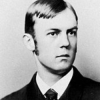Charles Horton Cooley

Charles Horton Cooley
Charles Horton Cooleywas an American sociologist and the son of Thomas M. Cooley. He studied and went on to teach economics and sociology at the University of Michigan, and he was a founding member and the eighth president of the American Sociological Association. He is perhaps best known for his concept of the looking glass self, which is the concept that a person's self grows out of society's interpersonal interactions and the perceptions of others...
NationalityAmerican
ProfessionSociologist
CountryUnited States of America
way surface attacking
There is no way to penetrate the surface of life but by attacking it earnestly at a particular point.
art failure creative
An artist cannot fail; it is a success to be one.
struggle passion self
The literature of the inner life is very largely a record of struggle with the inordinate passions of the social self.
self giving feelings
If love closes, the self contracts and hardens: the mind having nothing else to occupy its attention and give it that change and renewal it requires, busies itself more and more with self-feeling, which takes on narrow and disgusting forms, like avarice, arrogance and fatuity.
dark army decision
Form the habit of making decisions when your spirit is fresh...to let dark moods lead is like choosing cowards to command armies.
people imagination facts
The imaginations which people have of one another are the solid facts of society.
issues mind obscurity
The human mind is indeed a cave swarming with strange forms of life, most of them unconscious and unilluminated. Unless we can understand something as to how the motives that issue from this obscurity are generated, we can hardly hope to foresee or control them.
travel vacation self
To get away from one's working environment is, in a sense, to get away from one's self; and this is often the chief advantage of travel and change.
retirement mean successful
It happens from time to time in every complex and active society, that certain persons feel the complexity and insistence as a tangle, and seek freedom in retirement, as Thoreau sought at Walden Pond. They do not, however, in this manner escape from the social institutions of their time, nor do they really mean to do so; what they gain, if they are successful, is a saner relation to them.
thinking self games
Society is an interweaving and interworking of mental selves. I imagine your mind and especially what your mind thinks about my mind and what my mind thinks about what your mind thinks about my mind. I dress my mind before you and expect that you will dress yours before mine. Whoever cannot or will not perform these feats is not properly in the game.
government church needs
Institutions - government, churches, industries, and the like - have properly no other function than to contribute to human freedom; and in so far as they fail, on the whole, to perform this function, they are wrong and need reconstruction.
men artist desire
To desire to be an artist is to desire to be a complete man in respect to some one function, to realize yourself utterly. A man is a poor thing who is content not to be an artist.
suicide art writing
One should never criticize his own work except in a fresh and hopeful mood. The self-criticism of a tired mind is suicide.
life-and-love fall humanity
Failure sometimes enlarges the spirit. You have to fall back upon humanity and God.